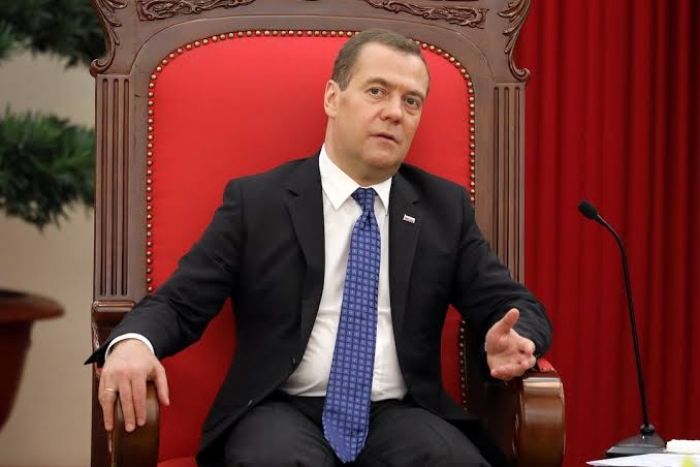RUSSIAN PERSPECTIVE
Russian retaliation ‘inevitable’ – Medvedev
Russia will “inevitably” respond to recent Ukrainian attacks on its territory despite continuing diplomatic efforts to reach a peaceful settlement of the conflict, former Russian President Dmitry Medvedev stated on Tuesday.
His comments follow suspected acts of Ukrainian sabotage on railways in Russia and drone strikes on multiple Russian airfields at the weekend. Despite this, Russian officials traveled to Istanbul on Monday for another round of direct negotiations with Ukrainian representatives.
In a social media post, Medvedev addressed domestic calls for a more forceful military response, declaring that Russian retaliation was “inevitable.”
“Our army is on an active offensive and will continue its push forward. Everything that needs to be blown up will be, and those who need to be eliminated will be,” he wrote.
Medvedev, who currently serves as deputy chair of Russia’s Security Council, said the Istanbul negotiations were necessary “for our victory to be most swift and the full elimination of the neo-Nazi authorities”in Kiev.
During the talks, Moscow proposed two possible routes toward a ceasefire and suggested a brief halt in the fighting to allow military units to retrieve bodies from the battlefield.
Ukraine’s Vladimir Zelensky called Russian negotiators “idiots” for proposing the idea, asserting that a ceasefire should solely serve to prevent further loss of life.
Kremlin spokesperson Dmitry Peskov called Zelensky’s remarks “awkward” and “unfortunate,” saying they undermined efforts to move the talks forward.
Moscow also offered to return the remains of over 6,000 deceased Ukrainian soldiers. Ukrainian Defense Minister Rustem Umerov, who is leading Kiev’s delegation, said Kiev would reciprocate by returning the same number of Russian military casualties. Vladimir Medinsky, a presidential aide heading Russia’s team, said Moscow agreed to accept all remains offered in return.
Kiev consented to direct negotiations with Moscow last month under pressure from US President Donald Trump, who has expressed exasperation with both parties and warned that Washington could “walk away” from mediation efforts if progress stalls.
WESTERN PERSPECTIVE
Power restored to 700,000 residents in Russian-held Ukraine after Ukrainian strikes
Emergency crews restored power on Tuesday to at least 700,000 residents across a swathe of southern Ukraine controlled by Russian forces, officials said, a day after Ukrainian shelling and drone attacks knocked out electricity substations.
There was no immediate comment from Ukraine, but the attacks, which targeted the Zaporizhzhia and Kherson regions, appeared to be the largest of their kind on Russian-held territory since the war began in February 2022.
"Thanks to the coordinated work of power engineers, the power supply to all customers has now been fully restored," Russia's Energy Ministry said on the Telegram messaging app.
Crews from other regions helped complete repairs.
Russia lays claim to Zaporizhzhia and Kherson, and already controls most of both regions. It is trying to capture the rest as part of what it casts as its push to ensure its own security and secure the future of ethnic Russians and Russian speakers.
Ukraine rejects Russia's portrayal of the conflict, calling it a colonial-style land grab by Moscow and vowing to retake the lost territory through a mixture of force and diplomacy.
The drone attacks came hours after Russian and Ukrainian delegations met in Turkey for peace talks where Moscow said it would only agree to end the war if Kyiv cedes big new chunks of territory and accepts limits on the size of its army.
Russian-backed officials said the situation at the Zaporizhzhia nuclear power plant - Europe's largest nuclear facility seized by Russia in 2022 - was under control but difficult.
Russian officials running the plant said radiation levels were normal at the facility, which operates in shutdown mode and produces no power at the moment.
WIDESPREAD OUTAGE
Yevgeny Balitsky, the Russian-installed governor of Zaporizhzhia, said on Monday that more than 600,000 people in nearly 500 settlements across the region lost electricity after Ukrainian shelling damaged high-voltage infrastructure.
In the Kherson region further west, Russia-appointed Governor Vladimir Saldo said debris from fallen drones had damaged two electricity substations, knocking out power to more than 100,000 residents of 150 towns and villages.
Separately, emergency services officials in the northeastern Ukrainian city of Sumy said on Tuesday that a Russian attack had killed three people and injured 28, including three children.
"The Russians launched a savage strike on Sumy – directly targeting the city and its ordinary streets with rocket artillery," Ukrainian President Volodymyr Zelenskiy wrote on social media.
The attack damaged an apartment building, three private residences, a warehouse and a hospital building, according to a statement from the emergency services.
There was no immediate comment from Russia on these Ukrainian reports.
Both Russia and Ukraine deny targeting civilians in their attacks. But thousands of civilians have died in the conflict, the vast majority of them Ukrainian.
For many long months during the winter, Ukrainian towns and villages endured repeated electricity cuts as Russian forces focused strikes on generating capacity.
Each side has accused the other of launching attacks on the Zaporizhzhia plant and running the risk of a nuclear accident.
The U.N. nuclear watchdog, the International Atomic Energy Agency, said last week in response to a Ukrainian complaint that it saw no sign of Russia preparing to restart the Zaporizhzhia plant and connect it to the Russian grid.
IAEA Director General Rafael Grossi told Reuters on Tuesday that conditions for restarting the plant were not present due to a lack of water for cooling and the absence of a stable power supply.
The IAEA has stationed monitors permanently at Zaporizhzhia and Ukraine's other nuclear power stations.
RT/Reuters
